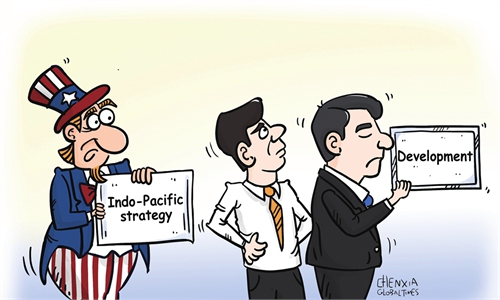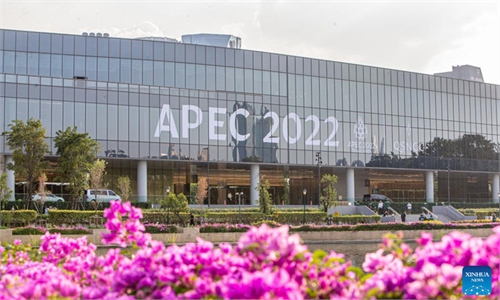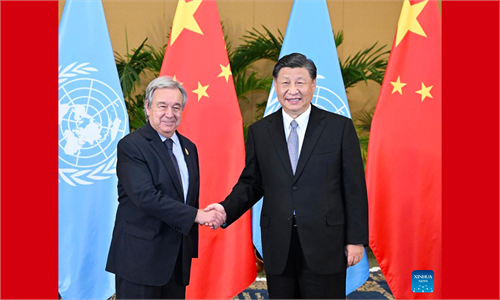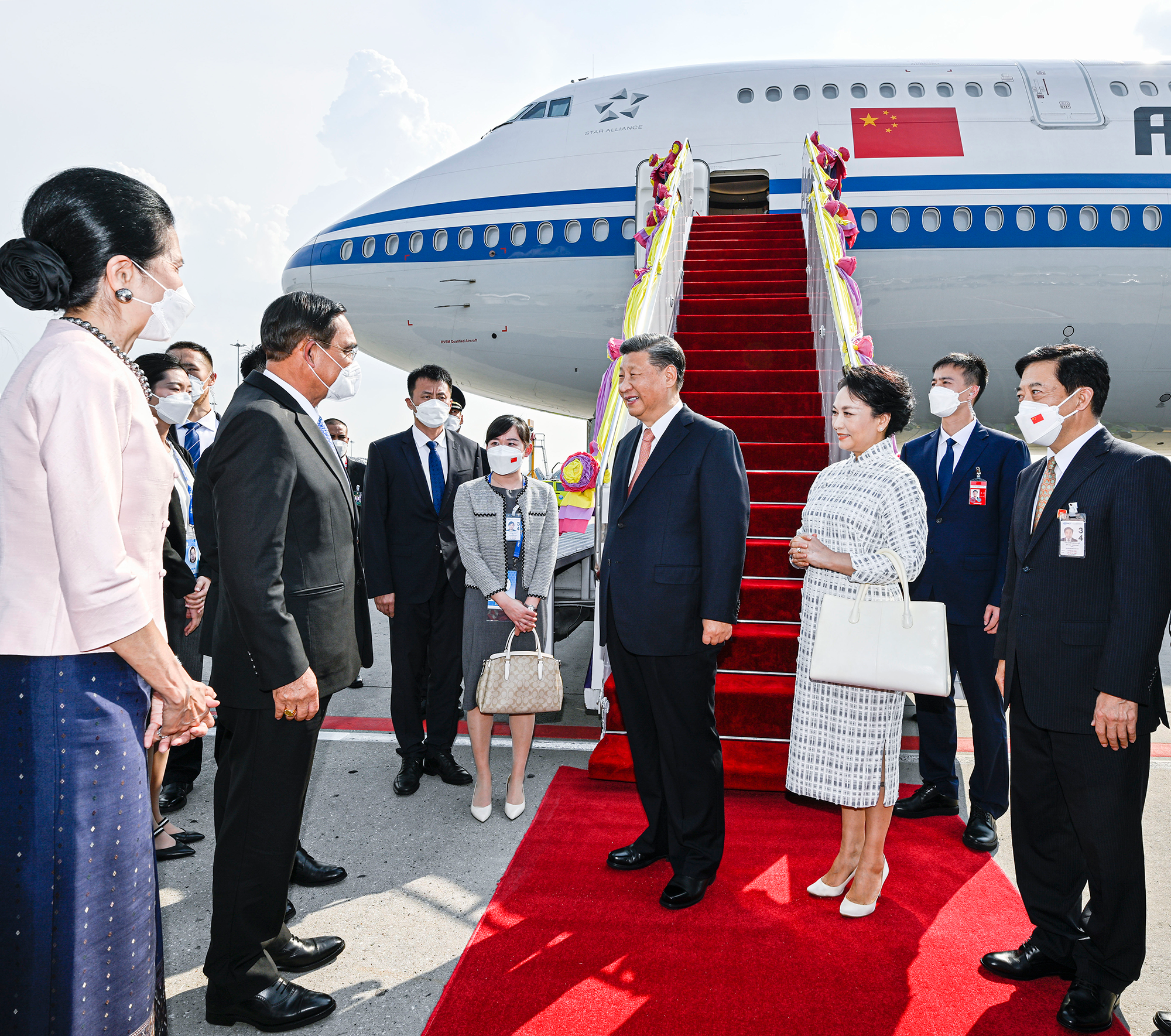
Chinese President Xi Jinping and his wife Peng Liyuan are warmly greeted by Thai Prime Minister Prayut Chan-o-cha, Deputy Prime Minister and Foreign Minister Don Pramudwinai and Minister of Culture Itthiphol Khunpluem and their spouses at Suvarnabhumi Airport in Bangkok, Thailand on November 17, 2022. Xi arrives in Bangkok for APEC meetings and a visit to Thailand. Photo: Xinhua
Chinese President Xi Jinping on Thursday delivered a written speech to the Asia-Pacific Economic Cooperation (APEC) CEO Summit held in Bangkok, capital of Thailand, calling for steadfastly advancing the Asia-Pacific regional economic integration and building a Asia-Pacific community of shared future, while rejecting any attempt to wage a cold war in the Asia-Pacific.
In his speech, delivered as he arrived in Bangkok on Thursday afternoon for a visit to Thailand and attendance at the APEC Leaders' informal meeting on Friday and Saturday, Xi also stressed that as China pursues Chinese modernization, it will remain committed to peace, development and cooperation, and delivering mutual benefit.
Xi's remarks offered the much-needed encouragement for regional businesses, which are facing great potential for cooperation but are also concerned about rising geopolitical tensions in the region, several local businesses said on Thursday. Many are also hoping for China's leading role in advancing peace and development in the region, as the US continues to focus on geopolitics.
'No one's backyard'
In the closely watched speech, Xi said that while the Asia-Pacific enjoys overall stability and win-win cooperation remains the underlying trend, the Cold War mentality, hegemony, unilateralism and protectionism are mounting, and acts that distort international norms, disrupt economic linkages, inflate conflicts in the region, and impede development cooperation are all too common.
"All these pose a challenge to peace and development in the Asia-Pacific," Xi said in the written speech, stressing that "The Asia-Pacific is no one's backyard and should not become an arena for big power contests. No attempt to wage a new cold war will ever be allowed by the people and by our times!"
The Chinese president called on regional economies to strengthen cooperation, support and help each other, and make the Asia-Pacific a leader in boosting global economy. "Unilateralism and protectionism should be rejected by all; any attempt to politicize and weaponize economic and trade relations should also be rejected by all," Xi said.
Xi's call for regional cooperation and rejection of Cold War mentality and protectionism offer great encouragement for regional businesses, including those in Thailand, which are becoming increasingly worried about geopolitical tensions and economic disruptions.
At the main venue for the APEC leaders' informal meeting in Bangkok on Thursday, some business representatives shared with the Global Times their concerns over geopolitical tensions and their hope for China to play a leading role in driving regional economic integration, especially in the post COVID-19 pandemic recovery.
"For every company, it's very important to reconnect after three years. So this APEC is an opportunity to connect with other economies after every one has closed for a long time. This is a good opportunity and a good time," Thanawit Chatrittichaikul, assistant manager of the public relations department at Energy Absolute, a major renewable power producer in Thailand, told the Global Times on Thursday, noting that the company is increasingly looking to expand cooperation with China.
In his written speech on Thursday, Xi said that the Chinese economy and the Asia-Pacific economy are interdependent and deeply integrated with one another.
The Chinese president also expounded on China's pursuit of Chinese modernization on all fronts, a call made at the recently concluded 20th National Congress of the Communist Party of China (CPC), stressing that "we will make greater contribution to world peace and development.
This is the first overseas trip for the Chinese president after the conclusion of the 20th CPC National Congress, which includes attendance at the just concluded G20 leaders' summit in Bali, Indonesia. This is also the first visit to Thailand by Xi as the Chinese president. This will also be the first time for Xi to attend the APEC leaders' meeting in person since 2018. The 2019 meeting was canceled due to the domestic situation in the host country Chile, and the meetings in 2020 and 2021 were held virtually.
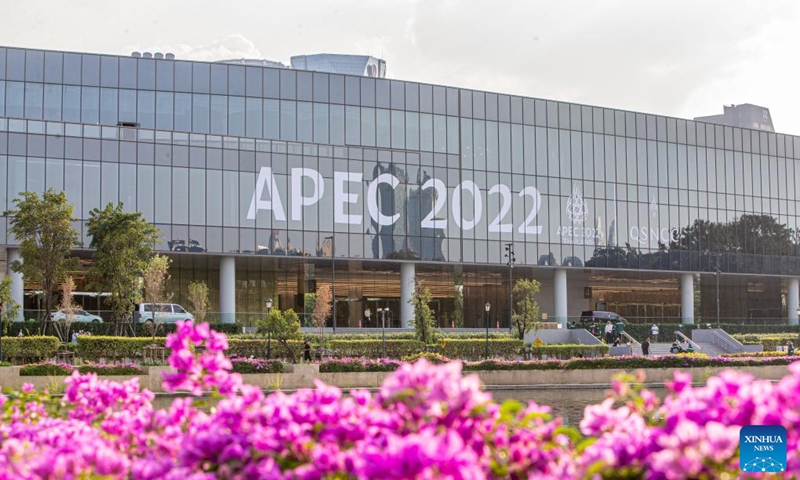
This photo taken on Nov. 12, 2022 shows the Queen Sirikit National Convention Center in Bangkok, Thailand. The 29th Asia-Pacific Economic Cooperation (APEC) Economic Leaders' Meeting will be held in Bangkok, Thailand, on Nov. 18-19. Photo: Xinhua
China's leading role
Given the high stakes of this year's meeting, the high expectations of the Chinese president's attendance at the APEC leaders' meeting and China's role in regional economic cooperation are evident beyond the venues at APEC and on the streets of Bangkok.
Amid high temperatures in the Thai capital on Thursday afternoon, many local residents gathered on a street waving Chinese and Thai national flags to welcome Xi to the country and attend the APEC leaders' meeting.
"Thai society has already been very much looking forward to this visit. Especially after three years of the COVID-19 pandemic, everyone is expecting President Xi's visit to promote closer Thailand-China ties in political, economic and other areas," a Thai citizen of Chinese descent named Ma Yan told the Global Times on Thursday, as she joined others to welcome Xi.
"The economic ties between ASEAN and China far exceed those with other economies. I hope this APEC meeting and President Xi's visit can become an opportunity to restart exchanges between economies that have been stagnant due to the epidemic in recent years," said Ma.
China, which is a major trading partner for many Asia-Pacific economies and a very important part of the regional industrial and supply chains, is widely expected to take a greater leading role in regional economic cooperation, as many regional economies are focused on development instead of geopolitical tensions, business leaders and analysts said.
"China is an important member of APEC. Since joining [APEC] 31 years ago, China has always advocated regional openness, and has always been committed to promoting trade and investment liberalization, facilitation, and economic and technological cooperation. It has played an increasingly important role in multilateral cooperation mechanisms such as APEC," Gao Lingyun, an expert at the Chinese Academy of Social Sciences in Beijing, told the Global Times on Thursday.
US' relevance questioned
In stark contrast, the US has been constantly instigating geopolitical tensions and seeking to create division in the region in order to promote its own geopolitical agenda, while becoming increasingly irrelevant in promoting regional peace and development, analysts noted.
In a clear sign of this trend, US President Joe Biden, who had just attended the G20 leaders' summit in Bali, Indonesia, decided to skip the APEC leaders' meeting, as he reportedly returned to the US for his granddaughter's wedding. The US is sending Vice President Kamala Harris to the meeting instead.
While some US media outlets have claimed that Biden's absence from the APEC leaders' meeting has raised questions about APEC's relevance, analysts stress that it is the US' relevance that is in question, as it only focuses on geopolitical disputes and appears uninterested in regional cooperation.
Even as Biden skips the meeting, leaders of non-APEC economies such as French President Emmanuel Macron are attending the meeting in Bangkok.
In another sign of the US' focus on geopolitics, ahead of the meeting, foreign reports said that Harris will discuss the Taiwan question and the South China Sea with other leaders.
However, at the venue of APEC leaders' meeting, some business representatives made it clear that they do not want to see confrontation. "We are most concerned about tensions in the Taiwan Straits, which impacts not just businesses in the region but also around the world," one business representative who spoke on condition of anonymity told the Global Times on Thursday.
During a high-profile meeting in Bali on Monday, Xi told Biden that the Taiwan question is at the very core of China's core interests, the bedrock of the political foundation of China-US relations, and the first red line that must not be crossed in China-US relations.
Chinese Taipei is one of the 21 economies of APEC, as is China's Hong Kong Special Administrative Region.
In his speech to the APEC CEO summit on Thursday, Xi also warned against bloc confrontation and vowed that China will continue to contribute more to regional and global development.
"History tells us that bloc confrontation cannot solve any problem and that bias will only lead to disaster," Xi said.
"Compared with the US, President Xi's attendance at the APEC leaders' informal meeting in person and the focus on economic issues fully reflects China's solid actions to promote the construction of an Asia-Pacific community with a shared future," Gao said.

